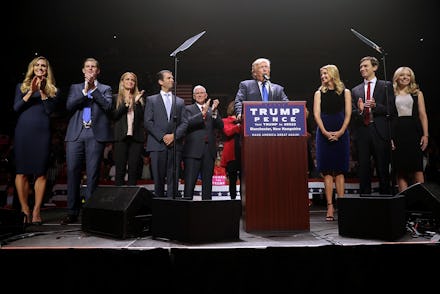Here’s what legal experts say the emails mean for Trump Jr., Jared Kushner and the president

On Tuesday the release of shocking email correspondences between Donald Trump Jr. and an associate revealed that the Trump campaign likely knew about Russia’s involvement in the election for over a year. Now many are wondering what kind of legal jeopardy the president, his son and his closest advisers may be in.
Here is how legal experts see the fate of Donald Trump Jr. and the president of the United States’ inner circle.
Donald Trump Jr.
Though some have already begun throwing around words like “treason” to describe Donald Trump Jr.’s solicitation of what appeared to be help from a foreign government to win an election, it’s unlikely such a charge would ever stick.
Treason has an incredibly narrow legal definition that can only apply to people who aide countries the U.S. is at war with, and while the U.S.’ relationship with Russia is icy, the two have never formally been at war.
However, that does not mean that the eldest Trump child isn’t in legal trouble. Under U.S. elections law, it is illegal to accept, or even solicit, any campaign contributions from a foreign government or entity. And, as election law expert Rick Hasen points out on his blog, the legal definition of a “contribution” has been defined pretty broadly over the years.
Hasen cites a particular case in which it was determined that privately commissioned polling results and any analysis resulting from those results would constitute a valuable if immaterial campaign donation.
But Hasen’s theory is not without its critics.
“I don’t think it’s illegal for candidates to gather information on their opponents,” said Saikrishna Prakash, a law professor at the University of Virginia. “And I think that’s without regard to where the information is coming from.”
Prakash said he is not as sure as Hasen that such information counts as a political contribution and questioned the implications of such an interpretation on future campaigns.
Jared Kushner
For White House senior adviser and Trump son-in-law Jared Kushner, the chief legal concern is whether or not he broke the law by failing to disclose his meetings with Russian officials when applying for top-level security clearance in the White House.
Earlier this year, it was discovered that Kushner had several other meetings with Kremlin-linked officials that he had failed to disclose, which had already put him at legal risk. When Kushner amended his disclosure forms he also included the meeting with the Kremlin-linked lawyer, leading some to assume that it was actually sources close to Kushner who leaked the story about Trump Jr. in order to get out ahead of the issue.
There’s a reason Kushner is being careful with his disclosures now. The penalties for failing to disclose important information on top-level security forms carry up to five years in prison. And in addition to his security clearance, Kushner is also under scrutiny for leaving key information off his financial disclosure as well.
But as Prakash points out, in order to be found guilty, it’s not enough to just leave things off your forms. Prosecutors would have to show that Kushner did so intentionally.
“I think his defense is going to be, ‘I didn’t remember this meeting,’” Prakash said. “Unless there are more meetings like this, I think he’s going to avoid being prosecuted.”
Donald Trump
Though the release of the Trump Jr. emails is a political liability for his father, it doesn’t necessarily indicate that he is in any new legal trouble. That’s not because Trump has made a compelling case that distances himself from this meeting — he hasn’t — but rather because he doesn’t have to answer to the same system that his son and son-in-law do.
As president the only thing he has to worry about is impeachment, and the only body that can make that happen is currently controlled by members of Trump’s own political party.
Under the Constitution, impeachment proceedings must begin in the House of Representatives. As Allan Lichtman, a professor of history at American University and the author of The Case for Impeachment, previously pointed out to Mic, there have already been plenty of opportunities for Congress to impeach Trump, most notably the many potential conflicts of interest he carried with him when he entered office.
What matters for Trump in the fallout from the emails is how it affects his standing with congressional Republicans, who have so far mostly avoided commenting on the issue. Some previous supporters like Rep. Lee Zeldin (R-N.Y.) have admonished the administration about the emails but have stopped short of calling for impeachment.
As the revelations continue to produce new questions in the ongoing investigation, one can expect at least a few within the president’s party to start reconsidering their willingness to seriously investigate Trump and his campaign. After that, the question is, will they be troubled enough by what they discover to impeach their own party’s leader?